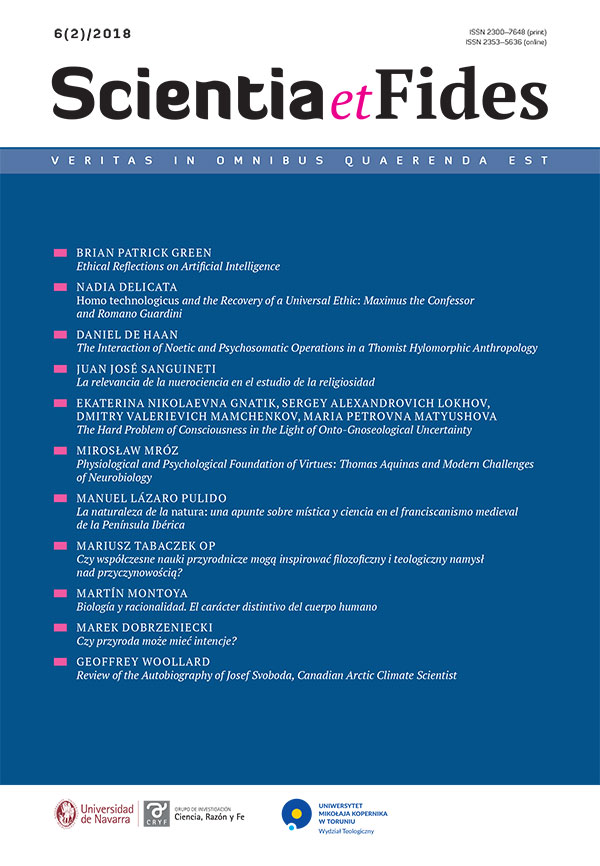Physiological and Psychological Foundation of Virtues: Thomas Aquinas and Modern Challenges of Neurobiology
Keywords
Virtue ethics, Brain, Neuronal ConnectionsAbstract
This article regards the field of neuroscience and indicates on the proper or erroneous functioning of the human brain. Intellectual virtues, especially practical wisdom (prudence/ prudentia) play a significant role in capturing the truth and implementing it in life. The agile formation of the cognitive function of man encompasses both his reason as well as the sensual judgment of utility with all the bodily backup (vis cogitativa). The brain possesses great plasticity in the production of neuronal connections. Habit as a permanent wont utilizes the reactions being developed to the construction of often inappropriate mechanisms, that in turn are not easy or completely impossible to eliminate. When practical reason is introduced into a false ethos, the brain responds by forming “ruts” of neuronal connections which seem difficult to consider as something appropriate. The reparation of the existing situation and the removal of the wrong habit require relevant virtues so as to unblock the psychological resistance that is deeply rooted within the physiological neuronal substrate. The learning about the virtues of St. Thomas Aquinas is the best warranty not only for theoretical explanations, but also for the practical application of virtues in dealing with the arised situation. Only well-formed virtues give the opportunity to correct the false instinctive cognition and liberate from erroneous actions.
References
Aristotle. 1988. „De Anima.” In O duszy, trans. P. Siwek. Warszawa: PWN.
Aristotle.2002. „Nicomachean Ethics.” In Dzieła wszystkie, vol. 5, trans. D. Gromska. Warszawa: PWN.
Ashbrook, James. 1984. “Neurotheology: the working brain and the work of theology.” Zygon. Journal of Religion and Science 19 (3): 331–350.
Brehmer, Joseph. 2010. “Pojęcie duszy w naukach kognitywnych.” In Osoba i dusza. Filozofia chrześcijańska, vol. 7, edited by Krzysztof Stachewicz, 37–63. Poznań: Wydział Teologiczny UAM.
Damasio, Antonio. 2011. Błąd Kartezjusza. Emocje, rozum i ludzki mózg, trans. Maciej Karpiński. Poznań: Rebis.
Francis. 2013. Evangelii Gaudium. Vatican City: Polyglotta Vaticana.
Gazzaniga, Michael S. 2013. Kto tu rządzi – ja czy mój mózg? Neuronauka a istnienie wolnej woli. Sopot.
Giertych, Wojciech. 2006. Jak żyć łaską. Kraków: Wydawnictwo M.
Giertych, Wojciech. 2015. Fides et passio. Pelplin: Bernardinum.
Glannon, Walter. 2011. Brain, Body, and Mind, Neuroethics with Human Face, 165–173. Oxford: Oxford University Press.
Głowala. Michał, 2012. Łatwość działania. Klasyczna teoria cnót i wad w scholastyce. Lublin: KUL.
Hamer, Dean. 2004. The God Gene: How Faith Is Hardwired Into Our Genes. New York: Doubleday.
Heil, John. 2013. Philosophy of Mind: A contemporary Introduction. New York: Routledge.
Horvat, Sasa. 2017. “Neuroscientific findings in the light of Aquinas' understanding of the human being.” Scientia et Fides 5 (2): 127–153.
Huzarek, Tomasz. 2017. “Knowledge Argument versus Bundle Theory according to Derek Parfit.” Scientia et Fides 5 (2): 237–250. DOI: http://dx.doi.org/10.12775/SetF.2017.027
Jaśkowski, Piotr. 2009. Neuronauka poznawcza. Jak mózg tworzy umysł. Warszawa: Vizja Press.
John Paul II. 1999. Ecclesia in Asia. Vatican City: Polyglotta Vaticana.
Kowalczyk, Kinga. 2012. “Neuroteologia – naturalistyczna konceptualizacja doświadczenia religijnego”, Hybris 17: 50–79.
Milcarek, Paweł. 1994. Teoria ciała ludzkiego w pismach św. Tomasza z Akwinu. Warszawa.
Persinger, Michael. 1987. Neuropsychological bases of God beliefs. Westport: Praeger.
Roszak, Piotr. 2014. Credibilidad e identidad. En torno a la teología de la fe en santo Tomás. Pamplona: Eunsa.
Stróżak, Paweł. 2018. “Filozoficzne rozważania nad strukturą bytu ludzkiego w świetle neuronauki poznawczej.” In Teologiczna, filozoficzna i naukowa wizja człowieka, edited by Paweł Moskal, 99–117. Lublin: KUL.
Sztajer, Sławomir. 2012. “Uniwersalia religijne a procesy poznawcze.” Przegląd Religioznawczy 243 (1): 61–68.
Thomas Aquinas. Scriptum super libros Sententiarum magistri Petri Lombardi episcopi Parisiensis, vol. 1–2, edited by Pierre Mandonnet, Paris: Sumptibus P. Lethielleux, 1929–1947; vol. 3–4, edited by Marie F. Moos, Paris: Sumptibus P. Lethielleux, 1929–1947.
Thomas Aquinas. 1984. Opera omnia iussu Leonis XIII P. M. edita, vol. 45/1: Sentencia libri De anima. Roma–Paris: Commissio Leonina – J. Vrin.
Thomas Aquinas. 1969. Opera omnia iussu Leonis XIII P. M. edita, vol. 47: Sententia libri Ethicorum. Roma: Ad Sanctae Sabinae.
Thomas Aquinas. 1988. Summa Theologiae. Milano: Editiones Paulinae.
Terruwe, Anna A., and Conrad W. Baars, 1981. Psychic Wholeness and Healing: Using All the Powers of the Human Psyche. Staten Island: Alba House.
Weker, Maria. 2018. Problem duszy w kontekście badań neuroteologicznych. In Teologiczna, filozoficzna i naukowa wizja człowieka, edited by Paweł Moskal, 119–135. Lublin: KUL.
Weker, Maria. 2016. “Searching for Neurobiological Foundations of Faith and Religion.” Studia Humana 5 (4): 57–63.
Woroniecki, Jacek. 1961. Wychowanie człowieka. Kraków: Znak.
Woroniecki, Jacek. 2008. W szkole wychowania. Teksty wybrane. Lublin: Instytut Edukacji Narodowej.
Zalewski, Dariusz. 2013. Wychować człowieka szlachetnego. Lublin: Instytut Edukacji Narodowej.
Downloads
Published
How to Cite
Issue
Section
License
CC BY ND 4.0. The Creator/Contributor is the Licensor, who grants the Licensee a non-exclusive license to use the Work on the fields indicated in the License Agreement.
- The Licensor grants the Licensee a non-exclusive license to use the Work/related rights item specified in § 1 within the following fields: a) recording of Work/related rights item; b) reproduction (multiplication) of Work/related rights item in print and digital technology (e-book, audiobook); c) placing the copies of the multiplied Work/related rights item on the market; d) entering the Work/related rights item to computer memory; e) distribution of the work in electronic version in the open access form on the basis of Creative Commons license (CC BY-ND 3.0) via the digital platform of the Nicolaus Copernicus University Press and file repository of the Nicolaus Copernicus University.
- Usage of the recorded Work by the Licensee within the above fields is not restricted by time, numbers or territory.
- The Licensor grants the license for the Work/related rights item to the Licensee free of charge and for an unspecified period of time.
FULL TEXT License Agreement
Stats
Number of views and downloads: 557
Number of citations: 7



